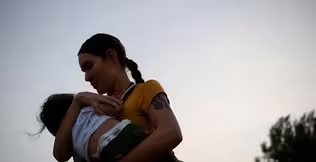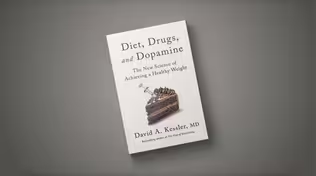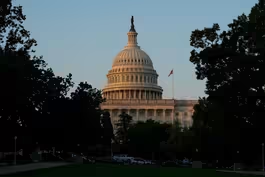
Grassroots network helps women circumvent abortion bans
Clip: 6/29/2025 | 6m 18sVideo has Closed Captions
The grassroots network helping women circumvent abortion bans and restrictions
Since the end of Roe v. Wade three years ago, 20 states have banned or restricted access to abortions. Despite those hurdles, women are still finding ways to terminate pregnancies. A new podcast, “The Network,” explores how an abortion pill fueled grassroots movements that helped change laws in Latin America. Ali Rogin speaks with co-hosts Marta Martinez and Victoria Estrada for more.
Problems playing video? | Closed Captioning Feedback
Problems playing video? | Closed Captioning Feedback
Major corporate funding for the PBS News Hour is provided by BDO, BNSF, Consumer Cellular, American Cruise Lines, and Raymond James. Funding for the PBS NewsHour Weekend is provided by...

Grassroots network helps women circumvent abortion bans
Clip: 6/29/2025 | 6m 18sVideo has Closed Captions
Since the end of Roe v. Wade three years ago, 20 states have banned or restricted access to abortions. Despite those hurdles, women are still finding ways to terminate pregnancies. A new podcast, “The Network,” explores how an abortion pill fueled grassroots movements that helped change laws in Latin America. Ali Rogin speaks with co-hosts Marta Martinez and Victoria Estrada for more.
Problems playing video? | Closed Captioning Feedback
How to Watch PBS News Hour
PBS News Hour is available to stream on pbs.org and the free PBS App, available on iPhone, Apple TV, Android TV, Android smartphones, Amazon Fire TV, Amazon Fire Tablet, Roku, Samsung Smart TV, and Vizio.
Providing Support for PBS.org
Learn Moreabout PBS online sponsorshipJOHN YANG: Good evening.
I'm John Yang.
Since the Supreme Court overturned the constitutional right to seek an abortion three years ago this past week, 20 states have banned or restricted access to the procedure.
Despite those hurdles, though, women are still finding routes to terminating pregnancies.
Currently, medication accounts for about two thirds of abortions.
How one of those pills fueled grassroots movements that helped change laws across Latin America is explored in The Network, a new three part podcast from NPR and Futuro Media.
MAN: Women Stop Dying.
MAN: We just started hearing that patients were taking some pills.
WOMAN (through translator): You can have a safe abortion and you can do it at home.
WOMAN: This is the story of that discovery.
But more than that, it's the story of the women behind it.
JOHN YANG: Ali Rogin spoke with podcast co-hosts Marta Martinez and Victoria Estrada, who are journalists at Latino USA, which is heard on NPR stations.
ALI ROGIN: Martha and Victoria, thank you so much for joining us.
Marta we are marking three years since the landmark Dobbs decision.
Walk us through the relative landscape of abortion access in the United States versus that of various countries throughout Latin America.
MARTA MARTINEZ, Co-host, "The Network": Since the Dobbs decision, there have been more abortions in the United States, not less.
And for a lot of people, it might sound shocking, but one of the experts we talked to who had worked for Planned Parenthood Global for many years, she was the one who saw what happened in Latin America 30 years ago.
And it was exactly the same thing.
In countries where abortion was mostly illegal or very highly restricted women found a way using abortion pills to have access to safe abortions and they created these underground networks that were helping women access those abortions.
And so what she told us is that she is seeing this happening in the United States more and more too.
We are seeing more access to abortion while at the same time it's becoming less legal.
ALI ROGIN: And the journey of this podcast, Victoria, starts in Brazil.
Walk us through why the experience of women there is so meaningful and also the fact that it informs so much of what we're seeing right now in the United States.
VICTORIA ESTRADA, Co-host, "The Network": Since Roe was overturned, we know that many Americans can't go to a doctor to have an abortion and some are turning to this abortion method that's been used around the world for decades.
And it all actually started in Brazil back in the 1980s where abortion was illegal in most cases and so women couldn't go to a clinic, couldn't turn to a doctor.
And in the mid-1980s, a pill that was actually created in the U.S. called misoprostol, or the commercial name is Cytotec, came to Brazil in 1986.
The side effect was that it wasn't recommended for women because it could cause contractions.
And women in Brazil saw that possible side effect and some started taking that pill and that they discovered this new way to have an abortion that is at home and is very safe.
And so in the first episode of the series, we chronicle this discovery from the point of view of doctors who at the time were witnessing how other self-induced abortion methods that the women were using were leading to various complications, hysterectomies and even death.
ALI ROGIN: I want to play a short clip from early on in the podcast describing this global network that the series is named after.
WOMAN: It's hard to even describe because it's not formal or centralized.
There's no CEO, no headquarters.
WOMAN: Some people work together, but plenty don't know each other.
They're midwives and nurses, grandmothers and friends.
WOMAN: This network crosses borders and reaches people throughout the world, from South Africa to Myanmar to Mexico and all over the United States.
ALI ROGIN: How does this network work and what do we know about how it started?
MARTA MARTINEZ: There is no one person who started all of this.
It was really a whisper network in Brazil, mostly by low income women of color, who really needed access to an abortion and were willing to experiment with their bodies.
Because at the time when they started using Cytotec or Misoprostol, and that's actually a pill that was created for stomach ulcers.
So they figured out this and they started just telling each other, you can just go to the pharmacy, you don't need a prescription.
Just get this pill and you can take it in this way and then this other way.
And this knowledge went beyond borders and started spreading across Latin America.
And in a matter of a decade, pretty much the whole region was using misoprostol in this way.
ALI ROGIN: What are some of the biggest challenges to this network as it exists in.
VICTORIA ESTRADA: The United States, in every state except Nevada, there are no laws that criminalize self-managing your own abortion.
But prosecutors are getting creative and using other types of laws to target women.
And the pills have also become a target.
We've seen how in Louisiana, misoprostol and mifepristone, which are the two pills used for abortion have been declared controlled substances.
And so having the pills can carry a fine, can land you sometimes in jail.
And they're also seeing ways to criminalize the people who support other people who are getting an abortion.
In Texas, one of those laws that target people who support others who are having abortions is the SB8 law, which makes it illegal to quote eight and abet a woman having an abortion.
But it's crucial also to say that the law doesn't define what that means.
And so it does put pretty much everything the network does into a legal gray area.
But it is a legal gray area.
And so I think that people are finding ways to work within those frameworks.
ALI ROGIN: Marta Martinez and Victoria Estrada, co-hosts of the new podcast "The Network," thank you so much for joining us.
MARTA MARTINEZ: Thank you for having us.
VICTORIA ESTRADA: Thank you for having us.
How Trump’s proposed program cuts affect Native communities
Video has Closed Captions
Clip: 6/29/2025 | 4m 13s | How Trump’s proposed health and education program cuts affect Native communities (4m 13s)
New book explores the science behind GLP-1 weight loss drugs
Video has Closed Captions
Clip: 6/29/2025 | 6m 15s | New book by former FDA head explores the science behind GLP-1 weight loss drugs (6m 15s)
News Wrap: Trump’s big budget bill advances in Senate
Video has Closed Captions
Clip: 6/29/2025 | 1m 57s | News Wrap: Trump’s big budget bill advances in Senate (1m 57s)
Pretty Yende’s journey from South Africa to opera stardom
Video has Closed Captions
Clip: 6/29/2025 | 4m 58s | Soprano Pretty Yende’s journey from rural South Africa to the top of the opera world (4m 58s)
Providing Support for PBS.org
Learn Moreabout PBS online sponsorshipSupport for PBS provided by:
Major corporate funding for the PBS News Hour is provided by BDO, BNSF, Consumer Cellular, American Cruise Lines, and Raymond James. Funding for the PBS NewsHour Weekend is provided by...















